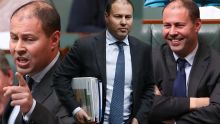LONDON: Malcolm Turnbull has hit back at internal critics of his government's policy direction, declaring the political centre ground is the "place to be".
More National News Videos
Turnbull's swipe at Tony
While giving a speech in London, Malcolm Turnbull has criticised Tony Abbott and other conservatives, saying the Liberal Party should sit in the sensible centre.
In his only major speech of a week-long trip to Germany, France and Britain, the Prime Minister delivered a rebuke to Coalition conservatives who criticised his government's second budget, recent school funding deal and other policies as being 'Labor lite'.
Chief among those critics has been former prime minister Tony Abbott, who last month released an alternative policy manifesto for the Coalition and who recently described the May budget as "second best".
Mr Turnbull's speech to Britain's premier centre-right think tank the Policy Exchange, where he will also be presented with the Disraeli prize by Home Secretary Amber Rudd, was due to be delivered late on Monday, Australian time.
The award is named in honour of Benjamin Disraeli, the first British prime minister from a minority background and according to the think tank, Mr Turnbull has won the award for maintaining a strong non-discriminatory immigration programme while emphasising the importance of integration.
In speech notes seen by Fairfax Media, Mr Turnbull will highlight that Liberal Party founder Sir Robert Menzies in 1944, "went to great pains not to call his new centre right party a conservative party – rather he described our party as the Liberal Party, which he firmly anchored in the centre of Australian politics".
"Menzies said: 'We took the name 'Liberal' because we were determined to be a progressive party, willing to make experiments, in no sense reactionary but believing in the individual, his right and his enterprise, and rejecting the socialist panacea.'

"The sensible centre was the place to be. It remains the place to be."
On his first visit to Britain as Prime Minister, Mr Turnbull will sit down with Ms May to discuss the fight against Islamic State, cyber security and intelligence sharing issues.
Both leaders are currently struggling to hold their parties together and maintain their authority.
Mr Turnbull's speech will also be welcomed by Coalition moderates, who believe the Prime Minister has ceded too much ground to the conservative wing of the Liberal Party on issues such as same-sex marriage and climate change policy.

National security is the central focus of the Prime Minister's visit to London, and will include meetings with spy agencies at Scotland Yard. Mr Turnbull is considering whether to merge Australia's various security, police and spy agencies into a British-style Home Office and this is also expected to figure in discussions.
Ahead of the pair's meeting, Ms May said Australia and Britain "are leading partners in the counter-Daesh [Islamic State] coalition, and as the fight moves from the battlefield to the internet we will work together to tackle the spread of Daesh's hateful ideology online".
In his speech, the Prime Minister will argue freedom and security must be "mutually reinforcing" and that "terrorism is the starkest and most urgent enemy of freedom".
"By fighting terrorism – with proportionate means – we are defending liberal values".
"The privacy of a terrorist can never be more important than the safety of the public. The information security of a terrorist or child abuser must not be protected above the personal security of our children, communities, values."
Both Mr Turnbull and Ms May were at the forefront of a push by world leaders at the G20 for tech companies to be obligated to provide access to encrypted communications on platforms such as WhatsApp to help authorities tackle terrorism.
On border protection, Mr Turnbull suggested that Australia offered lessons for a Europe grappling with how to respond to an influx of hundreds of thousands refugees from the Syrian civil war and elsewhere.
"The lesson is clear: weak borders fragment social cohesion, drain public revenue, raise community concerns about national security, and ultimately undermine the consensus required to sustain high levels of immigration and multiculturalism," he says.
"In contrast, strong borders and retention of our sovereignty allow government to maintain public trust in community safety, respect for diversity and support for our immigration and humanitarian programs. I say to critics of our border protection policies: Are these not precisely the outcomes that every just and decent society should seek?"
The speech comes after another Newspoll on Monday confirmed Labor's 53-47 lead over the Coalition, and amid rising anger in the Coalition about Mr Abbott's series of speeches and interventions that many government MPs believe has crippled the government's ability to recover in the polls and regain its standing with voters.















